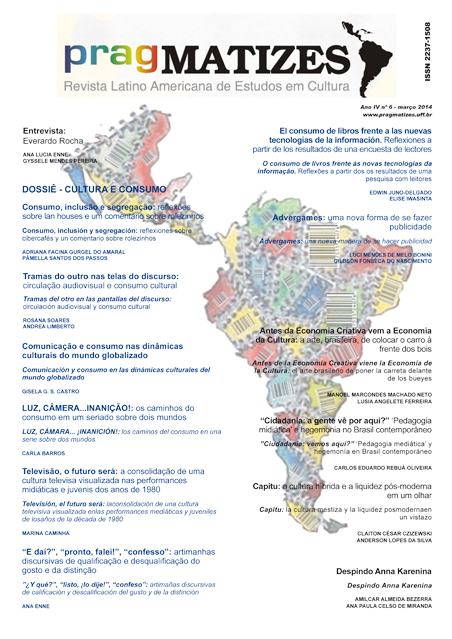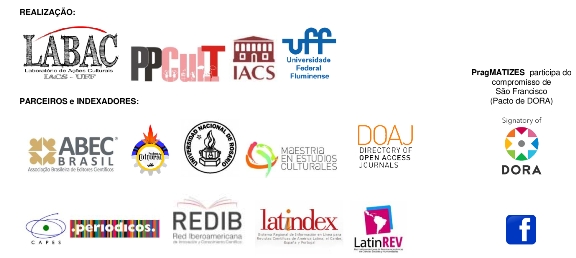ADVERGAMES: UMA NOVA FORMA DE SE FAZER PUBLICIDADE
DOI:
https://doi.org/10.22409/pragmatizes.v0i6.10378Resumo
O objetivo deste trabalho é analisar um advergame, ou game publicitário oferecido ao consumidor que esteja conectado à internet. Os estudos teóricos sobre publicidade na internet ainda estão em processo em construção e a utilização deste tipo de publicidade teve explosão nos últimos anos, mas apesar da ampla propagação da internet, a sua lógica, linguagem e limites ainda não são completamente compreendidos. Os advergames apresentam-se como uma mídia híbrida, uma ferramenta promissora para profissionais da área que enfrentam uma crise na publicidade tradicional. A presente análise atenta para o jogo publicitário "O impossível é possível: minha vida de game" da Coca Cola Zero que conta a história de um jovem buscando tempo para poder estar com os amigos e com a namorada. Algumas questões emergem neste percurso: de que forma o ciberespaço tem sido utilizado para novas plataformas e linguagens publicitárias? Em que medida as narrativas dos games atuais se parecem com as narrativas dos romances na construção do herói? Como os processos sígnicos são construídos para a identificação com o público-alvo no advergame objeto desta pesquisa? Os autores que norteiam este trabalho são: Bakhtin (1997); Castells (2001); Santaella (2002 e 2005); Jung (2008), Correia e Pereira (2009); Nesteriuk (2009); Santaella e Feitoza (2009); Novak (2010); McGonigal (2012); Santaella e Nöth (2012); Mlodinow (2013).Os resultados iniciais nos conduzem a uma compreensão do uso contínuo da referencialidade cotidiana do consumidor jovem, que é um cidadão comum imerso no mundo pós-moderno que tem como o vilão o tempo. A narrativa presente se entrelaça no mundo onde a Coca Zero está inserida para ajudar o cidadão (herói) e instaurar uma realidade em que a felicidade está sempre presente.
Downloads
Referências
ica recebida. REFERÊNCIAS
BAKHTIN, Mikhail. Estética da criação verbal. São Paulo: Martins Fontes, 1997
CASTELLS, Manuel, A Galáxia internet Reflexões sobre internet, Negócios e Sociedade, Lisboa: Fundação Calouste Gulbenkian, 2001.
CORREIA, Rosário, PEREIRA, Francisco C. Advergames em Portugal e estratégias utilizadas, In Congresso SOPCOM, Sociedade dos Media: Comunicação, Política e Tecnologia. Anais, Universidade Lusófona de Humanidades e Tecnologias, Campo Grande. Lisboa. 6º SOPCOM, 2009. p. 4050 - 4071
DUARTE, Ana, Adopção da In game Advertising em Portugal, 2009. Dissertação (Mestrado em Marketing Management) Instituto Universitário de Lisboa. Lisboa. 2009
JUNG, Carl G. O Homem e seus símbolos, Rio de Janeiro: Nova Fronteira, 2008.
MAGALHÃES, Hilda, G, D. SILVA, Luíza, H, O. Do herói ficcional ao herói político. Revista Multidisciplinar Ciência e Cognição UFRJ. Rio de Janeiro. 18- 30 v.12, 2007.
MARTINS, José D. S. O senso comum e a vida cotidiana. Revista Tempo Social, Revista de Sociologia da USP. São Paulo 1-8, v.10 n 1, 1998.
MEDEIROS, J.F. Advergames: A publicidade em jogos digitais como forma de atrair o consumidor. IN.: VIII Brazilian Symposium on Games and Digital Entertainment - Rio de Janeiro, 2009.
MCGONIGAL, Jane. A realidade em jogo: por que os games nos tornam melhores e como eles podem mudar o mundo, Rio de Janeiro: BestSeller, 2012
MLODINOW, Leonard. Subliminar: como o inconsciente influencia nossas vidas. Rio de Janeiro: Zahar, 2013
NESTERIUK, Sérgio. Reflexões acerca do videogame: algumas de suas aplicações e potencialidades. In: Lucia Santaella; Mirna Feitoza. (Org.). Mapa do Jogo - A diversidade Cultural dos Games. 1ed. São Paulo: Cengage Learning, 2009. p. 23-36.
NOVAK, Jeannie, Desenvolvimento de games. São Paulo: Cengage Learning. 2010.
RAHDE, Maria F. Comunicação e imaginário nos contos do cinema contemporâneo: uma estética em transição, Revista Comunicação, Mídia e Consumo, ESPM. São Paulo, v. 5 n. 12, 2008
SANTAELLA, Lucia. Matrizes da Linguagem e pensamento: sonora, visual e verbal, São Paulo: Iluminuras, 2005.
____________. Semiótica Aplicada, São Paulo: Pioneira Tomson, 2002.
SANTAELLA, Lucia & NÖTH, Winfried. Imagem, Cognição, Semiótica e mídia. São Paulo: Iluminuras, 2012
SANTAELLA, Lucia & FEITOZA Mirna. (ORG) O mapa do jogo: a diversidade cultural dos games, São Paulo: Cengage Learning, 2009.
Downloads
Publicado
Como Citar
Edição
Seção
Licença
Autores que publicam nesta revista concordam com os seguintes termos:- Autores mantém os direitos autorais e concedem à revista o direito de propriedade, com o trabalho simultaneamente licenciado sob a Licença Creative Commons Attribution que permite o compartilhamento do trabalho com reconhecimento da autoria e publicação inicial nesta revista.
- A revista se reserva o direito de efetuar, nos originais, alterações de ordem normativa, ortográfica e gramatical.
- As provas finais não serão submetidas aos autores.
- As opiniçoes emitidas pelos autores são de sua exclusiva responsabilidade.



